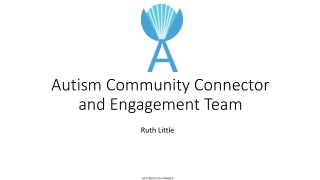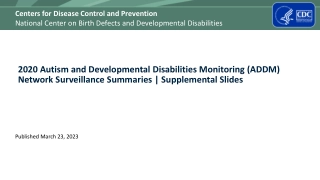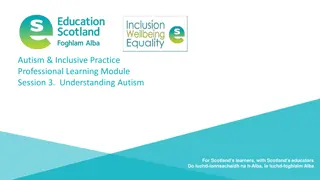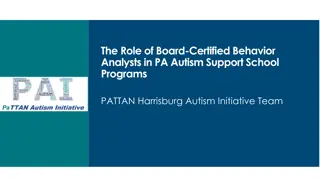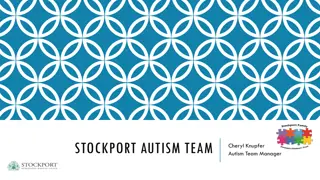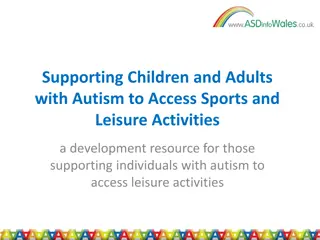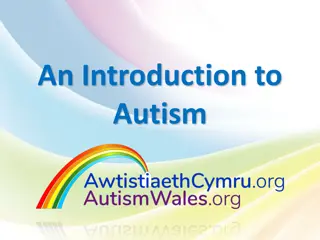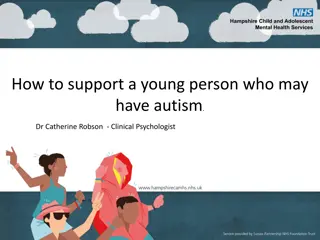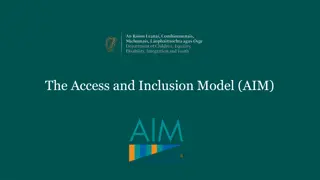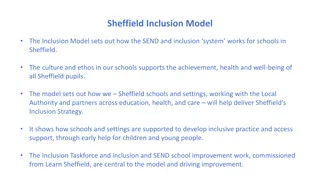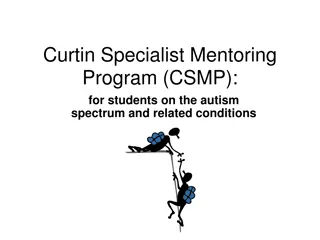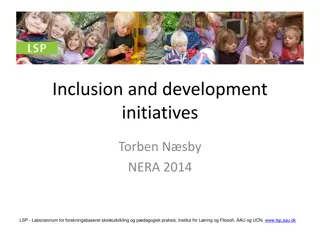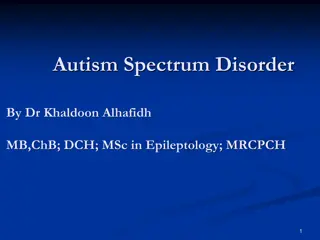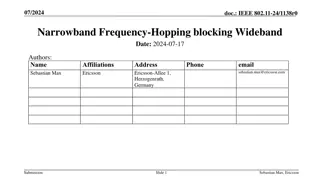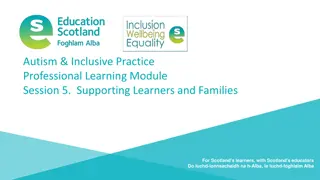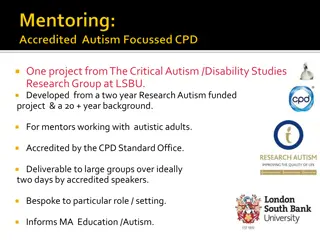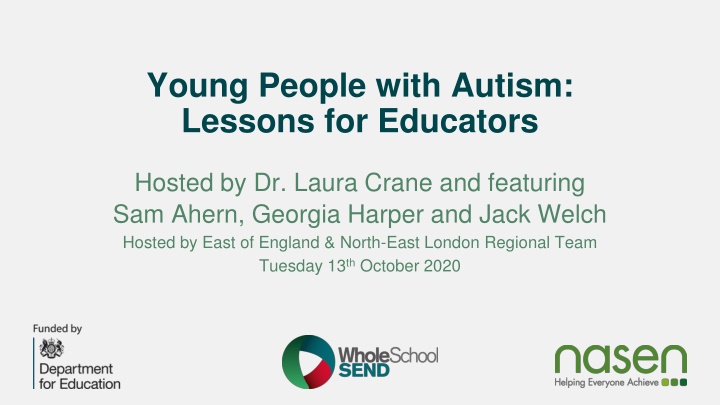
Strategies for Managing Obsessions in Young People with Autism
Discover effective strategies for managing the obsessions of young people with autism, such as incorporating their special interests into learning, setting limits on obsessions, and leveraging characters as tools for teaching right and wrong behavior. Insights from experts highlight the importance of understanding and guiding these special interests rather than eliminating them.
Download Presentation

Please find below an Image/Link to download the presentation.
The content on the website is provided AS IS for your information and personal use only. It may not be sold, licensed, or shared on other websites without obtaining consent from the author. If you encounter any issues during the download, it is possible that the publisher has removed the file from their server.
You are allowed to download the files provided on this website for personal or commercial use, subject to the condition that they are used lawfully. All files are the property of their respective owners.
The content on the website is provided AS IS for your information and personal use only. It may not be sold, licensed, or shared on other websites without obtaining consent from the author.
E N D
Presentation Transcript
Young People with Autism: Lessons for Educators Hosted by Dr. Laura Crane and featuring Sam Ahern, Georgia Harper and Jack Welch Hosted by East of England & North-East London Regional Team Tuesday 13thOctober 2020
Panellist Contact Details Laura Crane - @LauraMayCrane https://iris.ucl.ac.uk/iris/browse/profile?upi=LMCRA00 Georgia Harper @mindtheflap https://mindtheflap.wordpress.com/ Jack Welch - @MrJW18 https://medium.com/@MrJW18 Sam Ahern - @SamAhern3 https://www.samchown-ahern.com/
I have a pupil in Year 3 who is fascinated with Pokmon and he will blame his behaviour on the Pokemon, he will say that a Pokemon made him kick the teacher or a Pokemon had pushed the table over. Mum has asked about whether you had any advice about how you can control/manage the obsessions. She said that she has tried to limit the Pokemon chat but doesn't want to 'ban' it as he really enjoys it but feels that it is having a real negative impact on him. Does anyone have any advice about different strategies we could try to get him to want to talk about another topic or whether it is wise to tell him we can't talk about it anymore? JW: As it s his special interest, I wouldn t try to shut the conversation down entirely. It s perhaps using techniques as part of his teaching to apply the Pok mon in a reverse manner apply them to educate him that misbehaving in this manner isn t acceptable and the characters become a medium to communicate what s right and wrong. It s also understanding which Pok mon are provoking him to behave in this way and try to impress they are naughty and not very nice, so he shouldn t listen to them.
SA: I was really obsessed with E.T. the film as a child. I would talk about it constantly and want to watch the same scenes over and over again as well as show it to anyone who would want to listen. It wouldn t affect my learning per say, but whenever I was able to incorporate into learning, that began to benefit both myself and my teachers. As this is his special interest, don t take it away from him, if it makes him feel comfortable and (hopefully) able to socialise then that s always a positive. I don t have much knowledge of Pokemon, but I do know that there are a lot of game based fights where you have to choose a particular character. If he is watching a lot of Pokemon, then maybe he is either trying to re-enact signature moves from a specific Pokemon. I would say try and give him a time limit on how much he is allowed to either talk about it or watch it etc. If he allowed to bring in something from home (e.g. a toy character he likes), then that might help as well.
If you were transition from primary to secondary now, what supports would you be asking to be put in place? JW: Meeting SENCO in advance and having some kind of orientation before the school term begins would help, as well as getting to know some of the teachers who are going to be teaching subjects over the next year. Identifying the needs of the child and also what the parents think is important equally and those should be conversations as to what measures would be best suited to help ensure the transition is smooth. Having some kind of designated teacher to also oversee the child s welfare over the first few weeks and check they are coping in the new environment, by coping socially and academically, would also be valuable. LC: There is an evidence-based programme called STEP-ASD, which specifically aims to support autistic pupils during the transition from primary to secondary school. The handbook is available to buy, and includes suggestions as well as photocopiable transition tools and resources. https://www.amazon.co.uk/Autism-Spectrum-Disorder-Transition- Secondary/dp/1785920189
SA: I had a relatively good transition from primary to secondary, so most of the support that I received I would like to keep. Some examples of said support are. Visiting my secondary school more than once before the term started (this was both on a year 6 tour and during the summer). I got a photo book of what my school looked like both interior and exterior buildings as well as spaces such as the sports hall, library and canteen. I was able to meet the SENCO before term started and most importantly got to see where the SEN Department was located.
I'm interested to know your thoughts on this. I have a diagnosis of ADHD and when I was at school i wasn't aware that I was any different than anyone else so i just had lots of teachers telling me that I was not very good academically and that I struggled even though I thought i was the same as everyone else. I did some of my schooling in the United states and it was one of my teachers at a parents teacher evening telling my mother that I was just stupid and didn't get it that got her to get me checked to make sure all was ok. I was then given my diagnosis. I'm now training to be a teacher at a SEND school, I believe my diagnosis makes me connect with some of the kids in a better way as I have an understanding with them in that sense. But did you actually realise you were different to start with? JW: In some regards, yes. I knew I wasn t socially interacting with other peers or often quite withdrawn and not enjoying being physically at school. However, at a young age, you don t have the kind of capacity to comprehend that difference until you become a teenager and would do anything to not stand out. It s about providing the information, as age appropriate, at the right time and not scaremongering or making the child fearful about who they are.
GH: As a young child, not really it seems obvious in hindsight, but at the time I only felt different when the adults around me pointed it out! When I was diagnosed aged 9 I didn t really understand what it meant beyond a vague sense that I was different and struggled with social skills and I didn t really know what that meant either! When I got to secondary school, though, suddenly my peers began to make very clear what they thought about me and my differences or maybe I d only just become aware of it. I m glad I got the diagnosis when I did, because at least I had an explanation for this. Otherwise, I d have internalised all the other, more harmful labels the kids were giving me even more than I already did. SA: The short answer to this is yes. During primary school, I had teaching assistants with me all the time, so that did make me think and sometimes question, why do I have this and others don t? . Like both Jack and Georgia, I found it very difficult to grasp the concept of socialising and became sort of fascinated by the fact that so many of my peers (and my siblings) ended up being closer friendship wise. I don t think I really understood that I was different, but once I was diagnosed, then I think things began to slowly make sense.
Do you think it would've been better to keep the same TA all through primary or secondary, rather than have different ones even if they still worked in the school? SA: I had pretty much the same TA s throughout primary school which was good, due to the fact that there was no change and by the time I was in year 6, I had only had about 3 teaching assistants. During secondary school, that changed and I had a whole pleather of TA s during my first 2/3 years, until I said to the SENCO that I would prefer to have a handful of the same teaching assistants. Honestly, I think it really depends on the student. If they are okay with the fact that they might not be getting the same teaching assistant for different lessons, then that is absolutely fine, keep the rotation going. If on the other-hand, they prefer a familiar face during lessons (who is also able to provide effective support), then try to assign them to that student for a certain amount of time.
JW: I think its nice to have a rotation of different TAs and got on with several who were working at my secondary school. Of course, it s difficult when they leave or are not working at the school suddenly (how the job market is), but I think it s better to have built relationships with more than one, just so the pupil doesn t become too dependent or fixed or that individual when there is a change.
I am a SENCO at an infant school, aged 3-7 years old. I priorities building relationships, develop functional communications. In addition to this I also believe that children need to explore, connect and share to develop. Would you prioritise something else? JW: Understanding what makes them happy and how to manage difficult situations if they feel uncomfortable or appear to be misbehaving. It s better to know what that looks like, rather than assuming they re just doing it to gain attention. Those are otherwise very good priorities to work towards.
Do you all have EHCP, and if not did your school provide similar support or you were treated like others as normal student? Were you subject to more detentions? Do you struggle organising things? GH: I didn t have a statement of special educational needs (as it was called at the time) I did really well academically, so it was deemed unnecessary even though I struggled in so many other areas! By and large, particularly in secondary school, I was just treated like any other student. Before diagnosis in primary school, I remember being taken out of class sometimes to do activities 1-1 with teaching assistants looking back, I think that was part of them figuring out exactly what to assess me for! I was generally well-behaved so didn t get many detentions. However, there were a few times when I d be punished for lashing out during a meltdown usually with nothing for the people who provoked it in the first place.
SA: I was very rule abiding at school. I was constantly aware of the rules and would be petrified if I broke any of them, that I would be told off. Teachers would then see me as a model student in terms of behaviour, and because I was the quiet and did my work there was of course nothing wrong with me . Most teachers knew I was statemented and I think some of them freaked out a bit, so the option of sticking me at the back of the class with a TA was presumably, in their eyes, the best thing for me. In answer to your last question, yes, I struggle (d) to plan and organise my time. Completing homework or coursework on time was a nightmare, and due to the fact that I was so scared about getting a detention, I would complete it but the work would not be up to the standard that was expected.
Im curious about suggestions for how to help foster friendships without pressuring students to fit specific social norms? JW: It s perhaps knowing how students understand and react to somebody else s difference. Are they able to act maturely and know that person s difference, whilst not treating them in a way that is awkward or unkind. In my case, a lot flourished from the space during break times and being able to sit around the table together, which meant conversations and building that closeness came more naturally.
SA: Hmm, this is tricky. Most students want to appear normal to their peers, this is why a lot of autistics mask their way through school and even into adulthood. Of course, students don t want to be singled out, and having peers responding to difference with maturity and respect is vital to both confidence and self-esteem. There was a time where I had social skills along with 2 other boys at school, this mostly consisted of them talking and the teachers trying to squeeze me into the conversation. Not that this didn t help, but I think this was the school s way of trying to support me when it came to socialising.I would say, trying to find those who have similar interests to yourself obviously helps, that makes it easier to start conversations. Maybe trying out clubs both inside and out of school, this is good due to the fact that this is activity based and gives you something to do, without having to stress about conversations. A lot of socialising is now done online (this brings up a whole new set of rules and discussions that could cover an entire talk, and one which I am not an expert in) and for some autistic people, it makes it easier to communicate and find friends. Online safety is something that we didn t cover in the talk, and it is that is really important to educate autistic students on, as well as educating their non-autistic peers.
Hi, thank you for your contributions. Its been very useful to say the least. What would you recommend for convincing parents to agree to getting assessment? GH: This isn t something I have much experience in, but two things spring to mind in tackling the stigma that often comes with an autism diagnosis. Firstly, it s always worth highlighting the potential strengths that come with being autistic this varies from person to person but might include things like attention to detail, creativity, skills relating to their special interests or even the ability to focus so intensely and get so much joy out of something! When I was diagnosed in 2003 my parents were basically left to Google it and got all kinds of horror stories about what I d never be able to do, so it s important to also highlight what the child can do and don t frame that as despite their autism , a lot of the time it s because of their autism. The other thing that s worth noting is if the child is autistic, they will be autistic whether you diagnose and support them or not. Generally, bullies don t target a child because they ve seen a bit of a paper from a doctor they target a child because they stand out as different. Employers don t always discriminate because someone discloses an autism diagnosis they also discriminate with recruitment practices designed for neurotypical people and by judging someone based on neurotypical standards.
GH (continued): Sometimes people dont want to label a child, but sadly an autistic person is likely to attract all kinds of harmful, hurtful labels anyway at least if you give them a correct label first, the others are less likely to stick. An autism diagnosis will help the child understand themselves and figure out how to work with their brain rather than against it, and will help others support them in working towards that. Even if it turns out that the child is not autistic, the very fact they re being considered for an assessment suggests they have some other need that is not being met, and the assessment should help point you in the right direction towards finding out what that is and how to help. JW: It improves the child s outcomes, if you re talking about autism assessment. They can access support and the interventions which will ensure they have the adjustments to help better cope in schools. Can t think of any better reason than that.
A lot of you touched on your very moving and difficult recounts of bullying. You have mentioned the importance of not disclosing diagnosis, but do you have any idea of ways to deal with students who are bullying someone with SEND? JW: There s a lot of talk about zero-tolerance policies in schools, so apply them. It s about educating those offending individuals about accepting difference and getting to the root cause why they are bullying SEND pupils. There are always prejudices as a result of parents or other situations they ve been exposed to it s not inherent, so trying to rewire how they perceive others around them will serve them in the long run into adulthood.
SA: When I was being bullied throughout my time at school, a lot of the teaching and support staff would sometimes get me to sit in a classroom with some of the other students who were bullying me and have a chat . An interesting thing that would come out of these discussions would be that the teachers would nearly always say to the students, that I was different and this is why I might present my behaviours in a certain way, compared to others. I m not suggesting getting those who are bullying certain students into the same room and talk it over, as that will be putting the spotlight on the young person and make them feel uncomfortable. If anything, those conversations that were had with both teachers and bullies made them realise there was a reason for why I was different, and wasn t about to change who I was.
I've just joined so apologies if this has been talked about already. What do the autistic young people think about the neurodiversity paradigm movement and the double empathy problem research. Do they think if schools taught perspective taking for all children, so all neurotypes could understand different ways of communicating and meet in the middle? GH: The double empathy problem rings true with a lot of my own experiences. Autistic people are constantly expected to put so much into meeting neurotypical expectations, even at the expense of their own wellbeing, yet we re considered selfish and unreasonable for asking our neurotypical peers to move a fraction of the way towards us. Autistic people are supposed to have deficits in reading body language, but it s amazing how much of my very obvious body language around sensory overload or other distress is completely missed by neurotypical people we re expected to use our words, even when we can t. I don t really have a magic fix for this it requires a huge attitude change across society, so school is as good a place to start as any other!
LC: There is an ongoing research project at Edinburgh University called Learning About Neurodiversity in Schools (LEANS), which aims to develop an evidence-based resource for teachers grounded in a neurodiversity framework. More information, including a link to sign-up to their mailing list, here: https://dart.ed.ac.uk/research/leans/
What advice do you have to communicate in a therapeutic way to support young people with possible or definite diagnosis as they are at times not keen to communicate their answers usually are I don t know . GH: If you aren t doing so already, it might be worth trying out different types of communication to see if anything else works better than speaking. Even as an adult, I m definitely more fluent in writing than verbally - this doesn t always come across in presentations, but bear in mind I ve already thought a lot about what I m going to say in advance! There are times at work where I find it easier to get something across in an e-mail or text, especially if I m already anxious. For others, this might also involve sign languages or a visual card system. JW: Social stories and photo symbols will probably help with this. If they are able to understand the image context and wording, it may be they prefer to communicate in a non-verbal manner. There are some resources out there who can help with this, especially schools that are run by Ambitious about Autism for example, where many pupils don t speak verbally.
SA: Most of my answers whenever someone asks me a question is normally I don t know , because I struggle to articulate things through verbal communication, or have a response to the question. A good example of this is, What do you want to do today? there could be multiple answers to this, so breaking it down into small chunks and not giving them too many options or giving them different types of nonverbal communicative tools. Things like social stories, pecs card system, writing/texting can be useful, but this also, helps the person dictate what they actually want to say clearly and effectively. One problem with verbal communication, is that we expect an answer straight away, or a conversation to flow at a certain pace. When it comes to asking questions, be specific about what you want. Quite a lot of questions are phrased very broadly, which makes them harder to answer, especially when there are multiple answers to choose from.
Were you ever offered the opportunity to take part in school clubs? if so did this help you socially? GH: I took part in various clubs on and off throughout primary and secondary school usually focused around an activity, like computers or science. This helped me socially in the sense that I had something to do at lunchtime/after school and could talk to my classmates about the activity rather than just being on my own, but it didn t result in any lasting friendships outside of the clubs. A youth club for disabled people (in practice it was mostly autistic people) started up outside of school when I was a teenager, and that was much more fruitful in terms of friendships. University societies were amazing for me socially many of my existing friends came through the Oxford Doctor Who Society in particular, as well as the university s Women s Campaign.
JW: Not really. I didnt have a huge interest and certainly at primary school, I was more content to be at home. I was offered an opportunity at secondary to go to a Children s Society based club, but I turned this down at the time on account it was a new environment and I wasn t sure what it would be like. In retrospect, I would have given this a try, just to see at least what it might have been like. At college, I hugely enjoyed Enrichment and did a Creative Writing course during my first year. SA: I took part in some music clubs, this didn t really help with me socially. The good thing, was that it gave me something to do and thankfully (for me) there wasn t much socialising involved due to the fact that we were there for rehearsal. I did a lot of extra curriculum activities outside of school, and funnily enough, most of my peers also did these activities. Socialising wise this was better than being at school, because there was an activity that we would be doing and this eventually made it easier to socialise with others, plus being out of school, made it less pressured to behave in a certain way.
Hello, this webinar is very interesting and I have learnt a lot about first hand pupil experiences. I have previous experience working in a special needs school as an LSA, and now am doing my teacher training in a mainstream school with year 2 children. I can definitely see more pressure and I am able to see how this is having a mental strain on children especially SEN pupils. My question is how does it feel when you are going through a meltdown and what strategies do you think helped you? Also I am really interested to understand what actually happens at that moment, physiologically and emotionally? JW: It can feel almost like you re out of control and don t have any sense of what you re saying or knowing how it s affecting others. It can be exhausting more than anything and after a few minutes, I would just want to be left alone. There may be a degree of physically lashing out or behaving out of character, as it were, but it is about that is responded to and managed by a responsible adult. I would say let the immediate explosion pass and only try to communicate once they re calm, in a space where it s quiet and not stimulating.
SA: Going through a meltdown is exhausting and physically draining. Think of it like waking up and with your head spinning not knowing where you are, or what has happened. Meltdowns are quick, and the aftermath of them needs to be handled with care and respect. Taking someone away and into a space which is quiet, calm and won t interfere with their sensory inputs (e.g. library, SEND department, a quiet/sensory room etc.) where they are able to have some time to process and space to breathe.
Do you think that teachers need more information/training about Autism when they are training to be teachers? JW: Yes amongst other conditions and learning disabilities. However, where possible, autistic trainers should be sought where possible to deliver this. I find those who can give the best advice are those with lived and professional experience combined. Build it as part of PGCE courses where possible or at least as an optional module for those specialising. SA: Absolutely, just having 1 autism training session, doesn t mean you are autism confident. Autism is complex and difficult to understand, and not every autistic student is going to have the same problems or find certain things easy etc. If you can, get an autistic person to do the training, as they are the best people to give said training, due to lived experience. The Autism Education Trust are a good organisation to get in contact with, as they do provide training for schools across the country.
Presentation References: Mate Crime - https://www.mencap.org.uk/advice-and- support/bullying-and-discrimination/mate-and-hate-crime Know Your Normal Campaign - https://www.ambitiousaboutautism.org.uk/what-we-do/youth- participation/youth-led-toolkits/know-your-normal DSA (Disability Student s Allowance) - https://www.gov.uk/disabled-students-allowances-dsas
Presentation References: Repetitive behaviours and stimming - https://www.ambitiousaboutautism.org.uk/information-about- autism/behaviour/repetitive-behaviours-and-stimming Special interests - https://www.ambitiousaboutautism.org.uk/information-about- autism/behaviour/special-interests M is for Autism - https://www.goodreads.com/en/book/show/25903348-m-is-for- autism
Useful Links: Whole School SEND Introductory video on Autism: https://www.sendgateway.org.uk/whole-school-send/find-wss- resources/nqt-videos.html WSS Consortium Partner Autism Education Trust: https://www.autismeducationtrust.org.uk/
Regional SEND Lead Contact Information and Download Links
1 National Director 2 National SEND Leaders Regional SEND Leadership 8 Regions 16 Deputy Regional SEND Leads 8 Regional SEND Leads
Find your region The Regions are based on the boundaries used by the Regional Schools Commissioner areas. You can find out which region your local authority comes under here: https://www.sendgateway.org.uk/whole-school-send/regions/
East of England and North East London (ENELON) Michelle Unstead DRSL2.ENELON@wholeschoolsend.com Heba Al-Jayoosi DRSL3.ENELON@wholeschoolsend.com Twitter:
National SEND Leaders Simon Knight simon@wholeschoolsend.com @SimonKnight100 Malcolm Reeve malcolm@wholeschoolsend.com @Malcolm_Reeve
The North (NORTH) Rachel Hargreaves RSL.NORTH@wholeschoolsend.com Dominic Wall DRSL.NORTH@wholeschoolsend.com Alistair Crawford DRSL2.NORTH@wholeschoolsend.com
Lancashire and West Yorkshire (LWY) Angela Holdsworth RSL.LWY@wholeschoolsend.com Lidia Cattrell DRSL.LWY@wholeschoolsend.com Nicole Dempsey DRSL2.LWY@wholeschoolsend.com
East Midlands, South Yorkshire and the Humber (EMSYH) Judith Smith RSL.EMSYH@wholeschoolsend.com Jane Starbuck DRSL.EMSYH@wholeschoolsend.com Emily Walker DRSL2.EMSYH@wholeschoolsend.com
West Midlands (WM) Nicola Davis RSL.WM@wholeschoolsend.com Amanda Wright DRSL.WM@wholeschoolsend.com Conrad Bourne DRSL2.WM@wholeschoolsend.com
South Central England and North West London (SCNWLON) Katherine Walsh RSL.SCNWLON@wholeschoolsend.com Matt McArthur DRSL.SCNWLON@wholeschoolsend.com Rebecca Jones DRSL2.SCNWLON@wholeschoolsend.com
South East England and South London (SESLON) Amelie Thompson RSL.SESLON@wholeschoolsend.com Tina Harvey DRSL.SESLON@wholeschoolsend.com
South West (SW) Erica Wolstenholme RSL.SW@wholeschoolsend.com Alison Betts DRSL.SW@wholeschoolsend.com Emma Vyvyan DRSL2.SW@wholeschoolsend.com
Whole School SEND Resources The Review Guides can be downloaded here: https://www.sendgateway.org.uk/whole-school-send/find-wss-resources/ The SENCO Induction Pack can be downloaded here: https://www.sendgateway.org.uk/whole-school-send/sencos-area/ The Condition-Specific Videos can be viewed here: https://www.sendgateway.org.uk/whole-school-send/find-wss-resources/nqt- videos.html
Recordings You can find recordings of our past webinars on our YouTube channel. Subscribe here to keep updated: www.youtube.com/c/WholeSchoolSEND
Please get in touch if you are struggling to locate any of the resources from this session info@wholeschoolsend.com
Thank you for attending! Join the Community of Practice: https://www.sendgateway.org. uk/whole-school-send/join-our- community-of-practice.html Sendgateway.org.uk Nasen.org.uk @wholeschoolSEND @nasen_org

